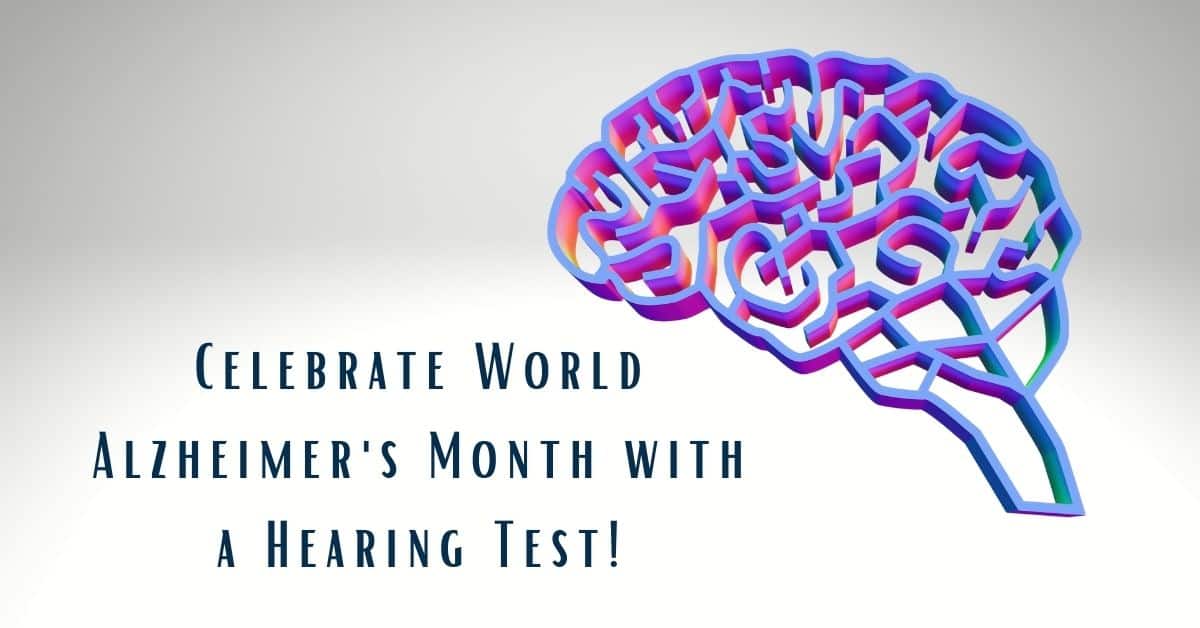0% financing available. Up to 3-year loss and damage guarantee.

Celebrate World Alzheimer’s Month with a Hearing Test
- Navigating the Conversation: The Significance of Thoughtful Disclosure in Hearing Loss - December 10, 2023
- The Sound of Dreams: Understanding How Hearing Loss Impacts Dreaming - November 7, 2023
- Traveling Effectively with Hearing Aids - October 16, 2023
Did you know that September is World Alzheimer’s Month? Alzheimer’s Disease International uses this month to educate people about Alzheimer’s disease and dementia. They want you to know the facts about Alzheimer’s disease, and recognize the early signs of this disease. World Alzheimer’s Month is also an opportunity to address the stigma of Alzheimer’s and dementia.
Everything You Need to Know About Alzheimer’s Disease
Alzheimer’s disease is a type of dementia. This degenerative brain disease often affects older adults. Alzheimer’s disease disrupts brain function and causes cell damage in the brain. It leads to slow decreases in cognitive function. People with Alzheimer’s disease often have trouble remembering things. They may struggle to complete tasks, and may experience mood or personality changes. Worldwide, it’s estimated that 50 million people have dementia or Alzheimer’s disease.
Seeing the Signs of Alzheimer’s Disease
Many people don’t recognize the signs of dementia or Alzheimer’s disease right away. They may think these early signs are just a normal part of aging. For example, they might think it’s normal for seniors to have some memory loss. It’s important to be on the lookout for the signs of Alzheimer’s disease. Early symptoms of Alzheimer’s disease can include:
- Memory loss that disrupts your daily routines. For example, you may forget to take your medication, lose your keys, or miss an important appointment.
- Difficulty performing daily tasks. This can include having a hard time getting dressed in the morning, or having trouble balancing your checkbook.
- Trouble communicating. You might have a difficult time following conversations. You could also be struggling with speech. The words might be on the tip of your tongue, but you may have a hard time finding the words you want to say.
- Confusion or disorientation. You might forget what day it is, or what time it is. You may even feel disoriented and not know where you are.
- Stressful social interactions. You may notice that it’s challenging to attend social events. Meeting friends might make you feel anxious or out of place.
- Alzheimer’s disease can lead to changes in personality. Your family may comment that you’re not acting like yourself, or that you seem different.
If you have noticed these early signs of Alzheimer’s disease, take action! Visit your doctor to go over the symptoms you’re experiencing. Find out if there’s any other cause of your symptoms, such as an infection or illness. Your doctor will help you manage your disease so you can slow the progress of Alzheimer’s disease.
The Connection Between Hearing Loss and Alzheimer’s Disease
Researchers are always looking for ways to treat or cure Alzheimer’s disease. Scientists from Johns Hopkins have dedicated years to the study of dementia and Alzheimer’s disease. They’ve found some interesting links, like the connection between hearing loss and Alzheimer’s disease. In one study, Frank Lin and colleagues discovered that people with even mild hearing loss are twice as likely to develop dementia.
Hearing loss can lead to more rapid cognitive decline. This may happen when your brain isn’t getting a clear picture of the sounds around you. Hearing loss also leads to social isolation. When you spend too much time alone, you may not be giving your brain the right kind of mental exercise.
Taking a Hearing Test
Are you ready to Celebrate World Alzheimer’s month? One of the easiest things you can do for your brain is to take a hearing test! When you treat your mild or moderate hearing loss, you’ll get all the benefits of clear hearing. Not only that, but you’ll help your brain stay active and healthy. This reduces your risk of developing dementia or Alzheimer’s disease. You can enjoy mornings at the office or afternoons with the grandchildren without worrying about your health.
Visit us for a hearing test. Our hearing health specialists will help you find out more about your hearing. Then we’ll help you find the right hearing aids for your hearing needs. Our hearing aids include features such as noise reduction and speech enhancement that will help you hear in tricky listening situations. We’ll calibrate the hearing aids to your unique hearing loss, and they’ll help you hear when you need it the most.
